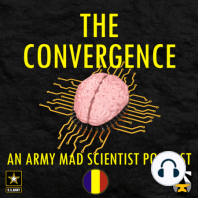40 min listen

50. Disinformation Threats to the All-Volunteer Force with MAJ Joe Littell and CPT Maggie Smith
50. Disinformation Threats to the All-Volunteer Force with MAJ Joe Littell and CPT Maggie Smith
ratings:
Length:
74 minutes
Released:
Feb 10, 2022
Format:
Podcast episode
Description
MAJ Joe Littell is a U.S. Army officer and researcher assigned to the Army Cyber Institute at the United States Military Academy. He has been an instructor in the Math and History departments, teaching statistics and intelligence history. His research includes computational propaganda, open source intelligence, narrative warfare, de-platforming, and generative media (such as deepfakes).
CPT Maggie Smith, PhD, is a U.S. Army cyber officer also assigned to the Army Cyber Institute, where she is a scientific researcher, an assistant professor in the Department of Social Sciences, and an affiliated faculty of the Modern War Institute. She is also the director of the Competition in Cyberspace Project.
In our interview with MAJ Littell and CPT Smith, we discussed the impact of information operations on recruitment, retention, and overall force readiness, and how we can gain information advantage over our adversaries. The following bullet points highlight key insights from our interview:
Western liberal democracies’ concept of the internet as a platform for the free exchange of ideas is not shared by Russia and China, who regularly manage the information available to their populations via their concept of “cyber sovereignty.” As a result, Russia and China have extensive experience in manipulating online information to influence both domestic and foreign populations via propaganda. The United States has not developed this skillset.
While Russia and China see information operations as a critical component of every operation, the United States has yet to adopt this strategy. Consequently, the U.S. is lagging behind its peer competitors in information warfare, oftentimes considering the narrative-building component of its actions only as an afterthought.
The technologies facilitating today’s social media age are not the first to impact information operations — the printing press and radio were two revolutionary technologies that have been weaponized to control public opinion. Today’s digital technologies, however, are unique in that actors can now buy data to determine what messaging will be most impactful, enabling them to precisely target groups of individuals.For example, in the run up to the 2016 Presidential election, Russia created “Blacktivist” and “Back the Badge” social media accounts t
CPT Maggie Smith, PhD, is a U.S. Army cyber officer also assigned to the Army Cyber Institute, where she is a scientific researcher, an assistant professor in the Department of Social Sciences, and an affiliated faculty of the Modern War Institute. She is also the director of the Competition in Cyberspace Project.
In our interview with MAJ Littell and CPT Smith, we discussed the impact of information operations on recruitment, retention, and overall force readiness, and how we can gain information advantage over our adversaries. The following bullet points highlight key insights from our interview:
Western liberal democracies’ concept of the internet as a platform for the free exchange of ideas is not shared by Russia and China, who regularly manage the information available to their populations via their concept of “cyber sovereignty.” As a result, Russia and China have extensive experience in manipulating online information to influence both domestic and foreign populations via propaganda. The United States has not developed this skillset.
While Russia and China see information operations as a critical component of every operation, the United States has yet to adopt this strategy. Consequently, the U.S. is lagging behind its peer competitors in information warfare, oftentimes considering the narrative-building component of its actions only as an afterthought.
The technologies facilitating today’s social media age are not the first to impact information operations — the printing press and radio were two revolutionary technologies that have been weaponized to control public opinion. Today’s digital technologies, however, are unique in that actors can now buy data to determine what messaging will be most impactful, enabling them to precisely target groups of individuals.For example, in the run up to the 2016 Presidential election, Russia created “Blacktivist” and “Back the Badge” social media accounts t
Released:
Feb 10, 2022
Format:
Podcast episode
Titles in the series (49)
48. Through the Soldiers' Eyes: The Future of Ground Combat with Denys Antipov, Heydar Mirza, Nolan Peterson, John Spencer, Jim Greer, and COL Scott Shaw: The character of warfare has consistently changed over time, with technology evolving from edged weapons, bows and arrows, gunpowder, and battlefield mechanization, to more advanced technologies today, including long-range precision weapons, robotics, and autonomy. However, warfare remains an intrinsic human endeavor, with varied and profound effects felt by Soldiers on the ground. To explore this experience with those engaged in the tactical fight, we spoke with the following combat veterans, frontline reporters, and military training experts for this episode of The Convergence: Denys Antipov is a Ukrainian war veteran who served as a platoon leader and reconnaissance drone operator with the 81st Airborne Brigade in the Ukrainian Army, defending his homeland and fighting Russian paramilitary groups and anti-government separatists by The Convergence - An Army Mad Scientist Podcast